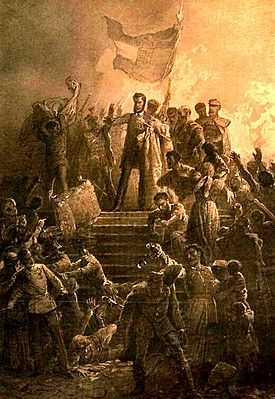Nemzeti dal

The Nemzeti dal ("National Song") is a poem written by Sándor Petőfi that is said to have inspired the Hungarian Revolution of 1848[citation needed]. Petőfi read the poem aloud on March 15 in Vörösmarty Square in Budapest to a gathering crowd, who by the end were chanting the refrain as they began to march around the city, seizing the presses, liberating political prisoners, and declaring the end of Austrian rule.
Hungarians celebrate the anniversary of the revolution on March 15. Red-white-green ribbons are worn to commemorate the fallen revolutionaries and the ideal of the revolution. Hungary briefly achieved independence from 1848–1849, but were defeated by the combined forces of the Habsburgs and the Russian Empire. Despite its ultimate defeat, the revolution initiated a chain of events that led to the autonomy of Hungary within the new Austro-Hungarian Empire in 1867.
The poem has come to rank third after the Himnusz and Szózat as a statement of Hungarian national identity.
The translation below of the "National Poem" is literal, attempting to convey the precise meaning of the original text.[1]
|
Nemzeti dal |
The National Poem |
|
Talpra magyar, hí a haza! |
On your feet, Magyar,[2] the homeland calls! |
|
Rabok voltunk mostanáig, |
We were slaves up til now, |
|
Sehonnai bitang ember, |
Useless villain of a man, |
|
Fényesebb a láncnál a kard, |
The sword shines brighter than the chain, |
|
A magyar név megint szép lesz, |
The Magyar name will be great again, |
|
Hol sírjaink domborulnak, |
Where our grave mounds lie, |
|
Written by: PETŐFI SÁNDOR (1848) |
Translated by: KŐRÖSSY LÁSZLÓ (2004)[4] |
References
- ↑ There is a more pleasing translation by George Szirtes: here: Retrieved 10 March 2011.
- ↑ The translation of magyar here, Magyar, is exactly equivalent to singular Hungarian
- ↑ Original "On" (and in all subsequent verses)
- ↑ Nemzeti Dal, Kőrössy.org